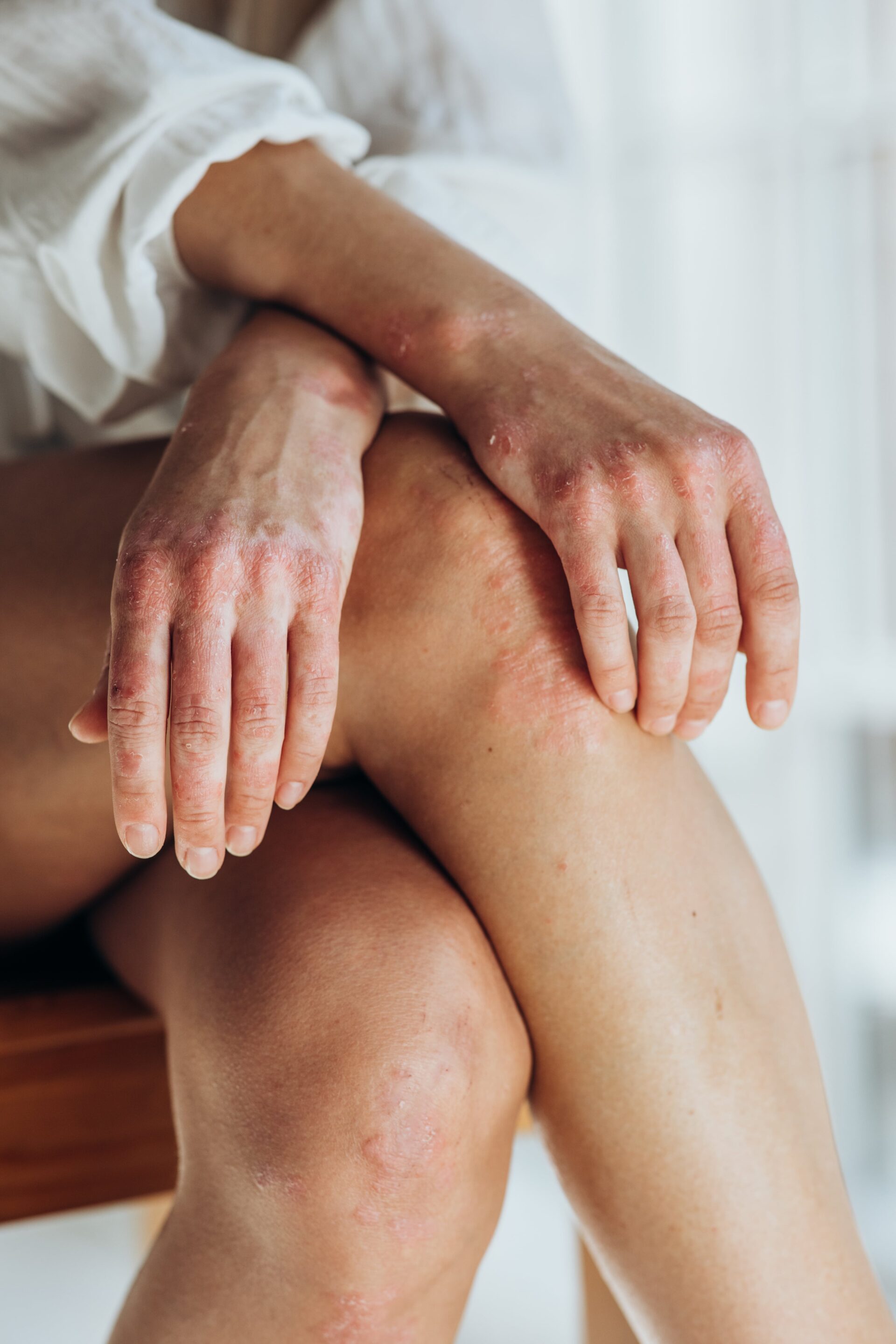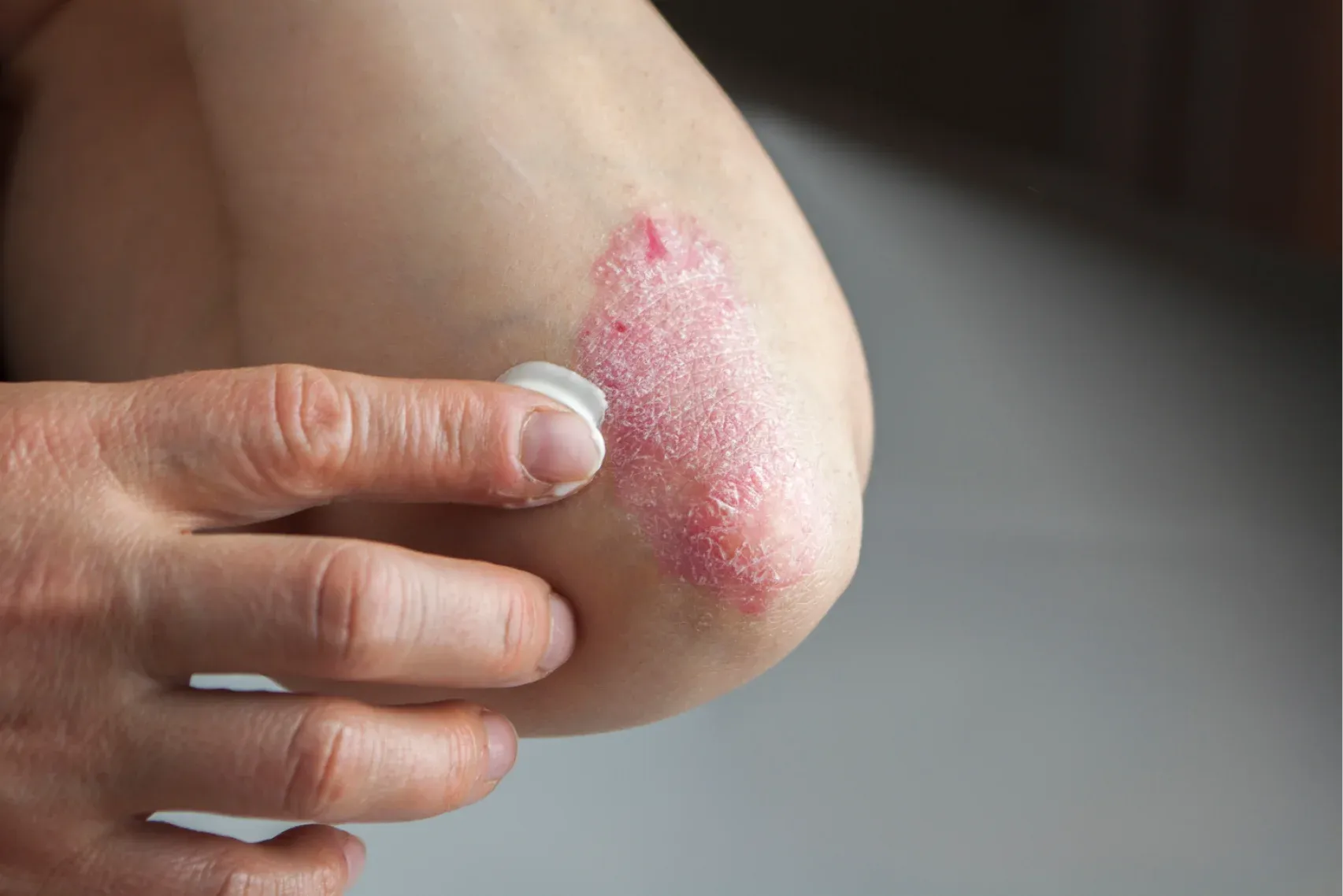Fortunately, under the care of the board-certified dermatologists at Elite Dermatology & Plastic Surgery, it is possible to effectively manage psoriasis symptoms and achieve healthier skin. Our knowledgeable team has helped countless patients throughout the greater Houston area find relief from psoriasis and live more comfortably and confidently.
What Causes Psoriasis?
The main cause of psoriasis is believed to be a combination of genetic and environmental factors. Symptoms tend to flare up in cycles, often triggered by stress, infections, injuries, or weather. When treating psoriasis, our board-certified dermatologists work closely with patients to identify their triggers, as this is an important first step toward effectively managing the condition.

What Is Psoriasis?
Psoriasis is an autoimmune condition that causes skin cells to grow and shed more rapidly than normal. This causes thick, red, and often scaly patches to form on the skin. These patches can appear anywhere on the body and are commonly associated with itching, soreness, burning, and dry, cracked skin.
Types of Psoriasis
There are five types of psoriasis of the skin:
- Plaque psoriasis
If you have plaque psoriasis, you’ll have rough, red patches of skin with a white layer of dead skin at the top. It’s most common to have these patches on the lower back, elbows, and knees. If you don’t resist the urge to scratch or rub, the skin patches can crack and start bleeding quite easily. This is the most common kind of psoriasis.
- Guttate psoriasis
Guttate psoriasis looks like tiny red dots, and it’s often found on your chest, arms, and legs. This kind of psoriasis may begin with a strep infection.
- Inverse psoriasis
Inverse psoriasis usually appears as bright red patches in the underarm area, below the breasts, or in the groin area. If you suffer from inverse psoriasis, it’s very likely that you also have another type of psoriasis.
- Pustular psoriasis
Pustular psoriasis appears as pus-filled bumps that look similar to whiteheads. It is mainly found on the hands and the soles of the feet. The skin around the bumps may redden dramatically.
- Erythrodermic psoriasis
Erythrodermic psoriasis can result from severe cases of unstable plaque psoriasis. With this kind of psoriasis, the red patches spread all over the body, and skin may peel off in large sheets.
Psoriasis may also present as inflammation in the joints, a condition called psoriatic arthritis. This condition requires treatment and monitoring under the care of a rheumatologist.
How Is Psoriasis Treated?
Elite Dermatology & Plastic Surgery offers a variety of treatments for psoriasis. Your treatment plan will be personalized based on the location of the lesions, the severity of the flares, and your symptoms. Options include:
- Topical medications such as topical steroids
- Other non-steroidal topical medications such as Zoryve® (roflumilast) or VTAMA® (tapinarof)
- Oral medications such as Otezla® (apremilast) or Sotyktu™ (deucravacitinib)
- Injection with biologic medications
Psoriasis is a chronic condition closely linked to metabolic health. Our board-certified dermatologists may suggest lifestyle modifications that may be beneficial to your overall health as well as your psoriasis.
Schedule Your Consultation at Elite Dermatology & Plastic Surgery
Don’t let psoriasis take over your skin — or your life. Contact Elite Dermatology & Plastic Surgery today to schedule an appointment for psoriasis treatment in Fulshear, Pearland, Heights, Vintage Park, River Oaks, or Kingwood. Our dermatologists are widely recognized as leading providers of medical dermatology services, including psoriasis treatments, and have the experience and expertise to help you effectively manage this condition.
Psoriasis FAQs
What triggers psoriasis flare-ups?
Psoriasis flare-ups can be triggered by stress, infections, cold weather, dry skin, certain medications, and injuries to the skin. Lifestyle factors such as smoking, alcohol consumption, and poor diet can also contribute to worsening symptoms. Identifying and avoiding triggers is a key aspect of managing psoriasis more effectively.
How much does psoriasis treatment cost?
The cost of psoriasis treatment varies depending on the severity of the condition and the type of treatment. Many insurance plans cover psoriasis treatments, so checking your coverage is recommended. Elite Dermatology & Plastic Surgery accepts many insurance plans. You can access our list of accepted insurance carriers here.
Can psoriasis be cured?
While there is no cure for psoriasis, our board-certified dermatologists can help you better manage the condition with topical psoriasis treatments, lifestyle modifications, and advanced biologic therapies. Contact us today to schedule an appointment, so we can determine the best treatment approach for minimizing your symptoms and preventing flare-ups.

Is psoriasis contagious?
No, psoriasis is not contagious. It is an autoimmune condition that results from an overactive immune system, leading to rapid skin cell turnover. It cannot be spread through physical contact, so there is no risk of passing it on to others.
What is the best treatment for psoriasis?
The best psoriasis treatment for you will depend on your distinct needs, triggers, and symptoms. To learn more about available treatment options and find out which is right for you, contact Elite Dermatology & Plastic Surgery to schedule an appointment with a board-certified dermatologist.

